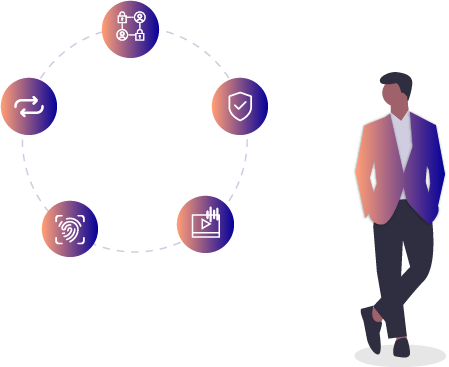API Suite
Identity & Business Verification Solutions
Go to market lightning fast with our easy-to-use, Plug and Play Fintech APIs. Embed any financial product or service on your platform using our APIs.


APIs For everything Fintech and more.
Lending? Connected Banking? KYC? Verification? Embedded Finance? Whatever your needs, we have you covered. We will help you reduce your GTM and improve efficiency.
And what’s even better? It’s fully customizable! Embed and integrate financial products from leading BFSI players onto your platforms using Signzy APIs the way you want your customers to see them.
APIs For everything Fintech and more.
Lending? Connected Banking? KYC? Verification? Embedded Finance? Whatever your needs, we have you covered. We will help you reduce your GTM and improve efficiency.
And what’s even better? It’s fully customizable! Embed and integrate financial products from leading BFSI players onto your platforms using Signzy APIs, the way you want your customers to see.

Select From the API stack

Lending
Faster Onboarding and Risk Management is the key to success. Explore Lending APIs here for KYC, KYB, Fraud Check, and others

Banking
Help your users to invest with ease. Explore Wealth Management APIs here for Stock Market, Mutual Funds, Fixed Deposits, and others

Investment
Help your users to invest with ease. Explore Wealth Management APIs here for Stock Market, Mutual Funds, Fixed Deposits, and others

Insurance Stack
Embed insurance products across the spectrum on your platform

Payments
Understand the financial behavior of users and issue Loans, Credit Cards, Prepaid Cards, or Creditline
Let’s Get Started
- Sign Up using your email id for a quick verification.
- Select your API or stack and integrate it onto your platform.
- Make it Live! When you are ready, just let us know and you’ll be live in no time.


Benefits For You
- Faster processing with reduced Turn Around Time (TAT).
- Customizable API Resources.
- State-of-the-art Technology.
- Simple Pricing, great payouts.
- Options for Infinite Scaling.
- Open Banking Ready.
Benefits For You
- Faster processing with reduced Turn Around Time (TAT).
- Customizable API Resources.
- State-of-the-art Technology.
- Simple Pricing, great payouts.
- Options for Infinite Scaling.
- Open Banking Ready.

The Best Designed APIs
Refined and calibrated to the best industry standards, our API solutions work to bring order to the chaos in finance.
- One Universal API to connect with any BFSI for a product.
- Single POC for all your needs.
- Maximum coverage across banks and FIs.
- Modular design.
- Safe, secure, and seamless.
- Premium developer support.



